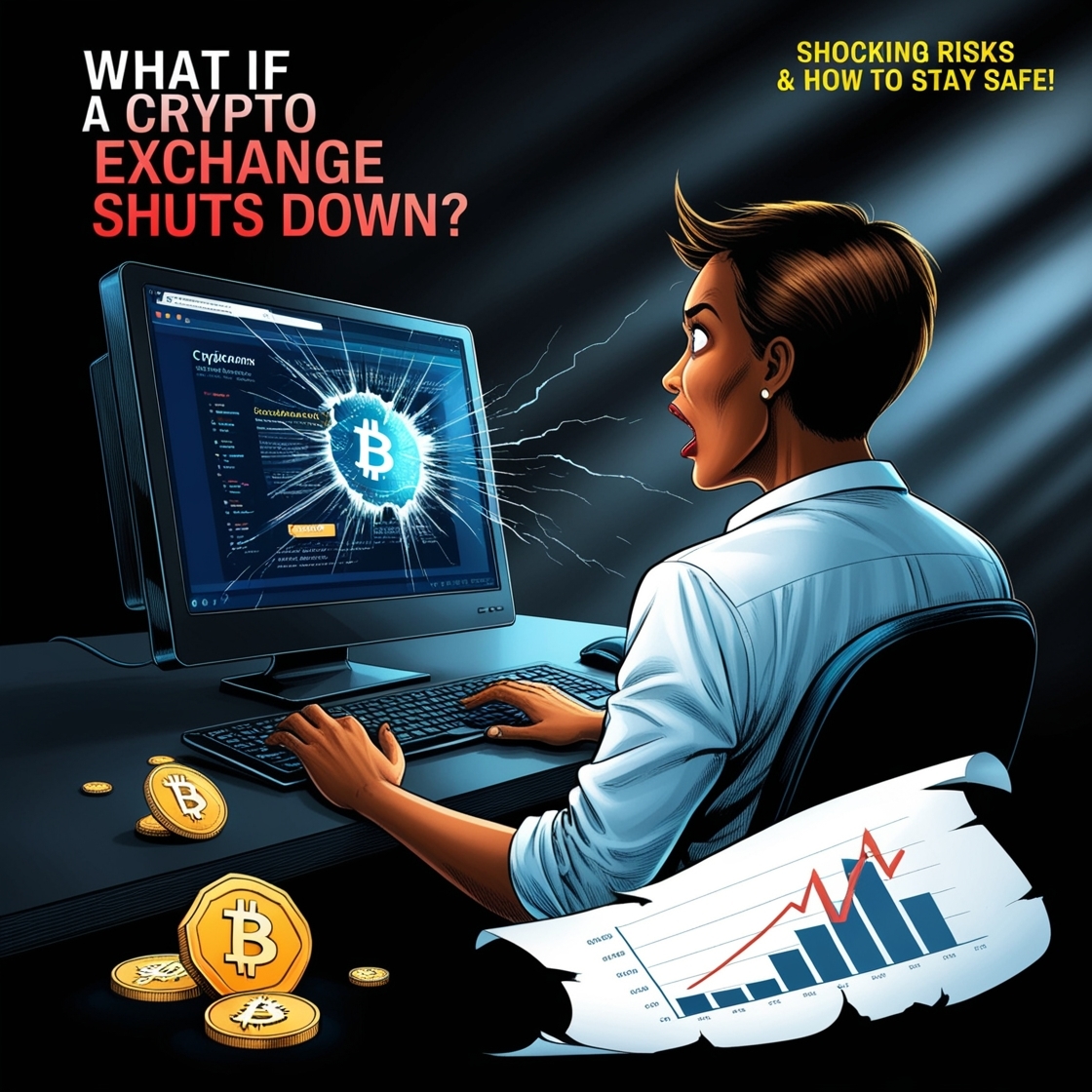Introduction: Why This Matters
Imagine waking up one morning, logging into your favorite crypto exchange, and seeing a message that says “Service Unavailable” or worse, “Exchange Closed”! Sounds scary, right? This has happened to thousands of crypto users before, and it could happen again.
If a crypto exchange shuts down, you could lose access to your funds forever. But don’t worry! In this guide, we will explore why exchanges shut down, what happens to your money, and how to protect yourself so you never have to face this nightmare.
We will also cover real-life cases, recovery options, and essential safety measures to keep your crypto secure at all times.
Why Do Crypto Exchanges Shut Down?

There are several reasons why a crypto exchange might shut down. Let’s break them down into simple terms with real-world examples.
1. Hacks & Security Breaches
Crypto exchanges are prime targets for hackers. If an exchange is hacked, it may lose millions or even billions of dollars, forcing it to shut down.
Mt. Gox (2014)
- Mt. Gox was the largest Bitcoin exchange at the time.
- Hackers stole 850,000 BTC, worth billions today.
- The exchange collapsed, leaving thousands of users without their money.
- Legal cases are still ongoing, and victims are still waiting for compensation over a decade later.
Coincheck (2018)
- Hackers stole $530 million worth of NEM tokens from the exchange.
- The exchange temporarily suspended withdrawals but later reimbursed affected users.
2. Regulatory Crackdowns
Governments and regulators sometimes ban or restrict exchanges, forcing them to shut down or relocate.
Binance & the U.S. Crackdown (2023)
- Binance, one of the largest crypto exchanges, faced multiple lawsuits from the SEC and CFTC.
- It was accused of operating without proper licenses and mishandling user funds.
- The exchange had to pay a $4.3 billion fine and make significant operational changes to continue functioning in some regions.
China’s Crypto Ban (2021)
- China banned all crypto trading, forcing major exchanges like Huobi and OKEx to relocate.
- Many users lost access to their funds due to government-imposed restrictions.
3. Scams & Fraudulent Exchanges
Some exchanges are scams from the start. They operate like Ponzi schemes, taking users’ money and disappearing overnight.
PlusToken Scam (2019)
- One of the largest crypto Ponzi schemes.
- Stole over $2 billion from investors.
- The exchange shut down, and the founders disappeared.
BitConnect (2018)
- Promised guaranteed returns to investors.
- Turned out to be a Ponzi scheme, leading to billions in losses.
- Shut down after regulatory scrutiny.
4. Poor Management & Bankruptcy
If an exchange is poorly managed, it might run out of money and be unable to continue operations.
FTX Collapse (2022)
- Once the second-largest crypto exchange in the world.
- CEO Sam Bankman-Fried mismanaged funds, leading to an $8 billion hole in the balance sheet.
- The exchange went bankrupt, leaving millions of users stranded.
QuadrigaCX (2019)
- The founder died mysteriously, taking all the exchange’s funds with him.
- Users lost over $190 million, with no way to recover them.
What Happens to Your Funds?
When an exchange shuts down, the outcome depends on why it closed:
- Hacks: Your funds may be lost forever unless the exchange refunds users.
- Regulatory Shutdowns: You may get some of your money back, but it could take months or years.
- Scams: Most likely, your money is gone.
- Bankruptcy: You may get partial refunds, but only after long legal proceedings.
How to Recover Funds If an Exchange Closes
- Check Official Announcements
- Visit the exchange’s website and social media.
- Join community forums and Telegram groups to stay updated.
- Try to Withdraw Funds (If Possible)
- Some exchanges allow limited withdrawals before fully shutting down.
- File a Complaint with Regulators
- Report the exchange to local financial authorities or consumer protection agencies.
- Join Class-Action Lawsuits
- Many affected users file lawsuits to get refunds.
- Example: FTX users are still fighting in court for fund recovery.
- Use Blockchain Tracking Services
- Platforms like Etherscan or Chainalysis can help track stolen funds.
How to Protect Your Crypto Assets

You can’t control whether an exchange shuts down, but you can protect your money with these simple steps:
1. Use a Secure Wallet (Not an Exchange Wallet)
- Never store all your crypto on an exchange.
- Use a hardware wallet like Ledger or Trezor.
- For smaller amounts, use non-custodial wallets like MetaMask or Trust Wallet.
2. Diversify Your Holdings
- Use multiple exchanges instead of relying on one.
- Keep some funds in decentralized wallets.
3. Stay Updated on Exchange News
- Follow crypto news to detect red flags early.
- If an exchange shows withdrawal delays or legal issues, withdraw your funds immediately.
4. Enable Two-Factor Authentication (2FA)
- Always use 2FA to secure your exchange account.
5. Withdraw Profits Regularly
- Don’t let all your money sit in an exchange for too long.
- Withdraw profits to a private wallet whenever possible.
Conclusion & Call to Action
A crypto exchange shutting down can be a nightmare, but with proper precautions, you can keep your assets safe.
Key Takeaways:
Stay calm and act fast if an exchange shuts down.
Use private wallets, not exchange wallets.
Keep track of exchange news.
Withdraw profits regularly.
